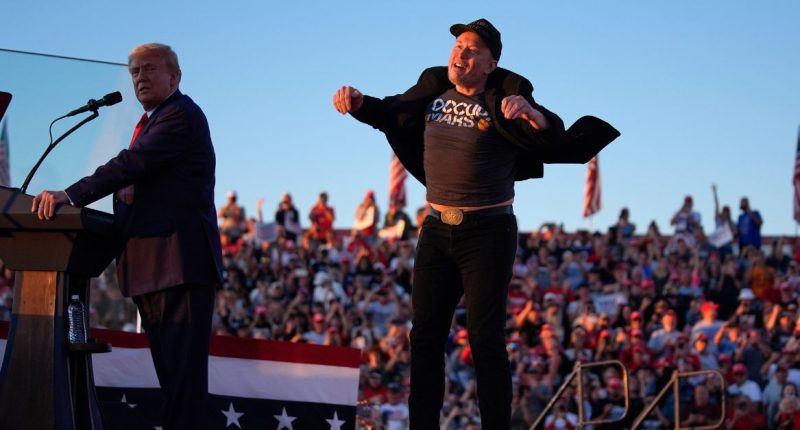Share this @internewscast.com
Elon Musk makes a surprise appearance on stage as the Republican presidential candidate, former President Donald Trump, addresses the audience at a campaign event at the Butler Farm Show on Saturday, October 5, 2024, in Butler, Pennsylvania. (AP Photo/Evan Vucci)
The complete bench of judges on a federal appeals court in Virginia turned down the Trump administration’s plea to provide the so-called Department of Government Efficiency (DOGE) with “immediate and unfettered” entry to the Social Security Administration’s (SSA) records systems, marking another legal setback for the president shortly after surpassing the 100-day milestone in office.
In a decision voted nine to six, the U.S. Court of Appeals for the 4th Circuit on Wednesday upheld a preliminary injunction issued by U.S. District Judge Ellen Hollander of Maryland. This injunction prevented the Elon Musk-led agency from accessing the highly sensitive personal data of “essentially everyone in the country.” The majority argued that the “fundamental” principle of the SSA maintaining confidentiality of personal data “has been disregarded by the abrupt grant to DOGE of unrestricted access to the SSA system of records.”
In the majority’s 12-page order, Circuit Judge Robert Bruce King, an appointee of Bill Clinton, heaped praise on Hollander, an appointee of Barack Obama, referring to her as a “very able district judge” who had “carefully and thoughtfully examined the evidence and the legal issues” in the case. He also noted that her initial TRO order was accompanied by a 137-page opinion, while her preliminary injunction order included a 148-page opinion.
King lauded Hollander’s dual opinions as “addressing extensive evidence proffered by the parties” and “refining the pertinent legal analysis” of the lawsuit. The complaint accused the administration of violating the Privacy Act and the Administrative Procedure Act by granting DOGE SSA system access, and claimed it was acting in an “arbitrary and capricious” manner by “flouting SSA protocols for hiring, onboarding, training, and granting systems access to the DOGE affiliates.”
Love true crime? Sign up for our newsletter, The Law&Crime Docket, to get the latest real-life crime stories delivered right to your inbox.
In her latest opinion in the case, Hollander noted that since the SSA’s inception in 1935, it has “collected, stored, respected, and protected” personal and private data of U.S. citizens. She then emphasized that ensuring the confidentiality of that information was a “bedrock principle of the agency” — a principle the Trump administration sought to change by giving DOGE “unfettered access to SSA systems.”
“The objective to address fraud, waste, mismanagement, and bloat is laudable, and one that the American public presumably applauds and supports,” Hollander wrote. “Indeed, the taxpayers have every right to expect their government to make sure that their hard earned money is not squandered.”
Rather, she said, the issue was how DOGE wants to perform its work, and how the SSA was willing to abandon its long-standing mission.
“However, the issue here is not the work that DOGE or the [Social Security Administration] want to do,” she continued. “The issue is about how they want to do the work. For some 90 years, SSA has been guided by the foundational principle of an expectation of privacy with respect to its records,” adding, “This case exposes a wide fissure in the foundation.”
Hollander ultimately found the plaintiffs were likely to prevail on the merits, as did the majority of the appellate court judges.
“[Hollander’s preliminary injunction] analysis of those claims and the preliminary injunction factors is lengthy, thorough, and compelling,” the appellate court’s opinion says. “Rather than repeating that carefully crafted analysis herein, I adopt and attach hereto the [preliminary injunction] Opinion in its entirety.”

















